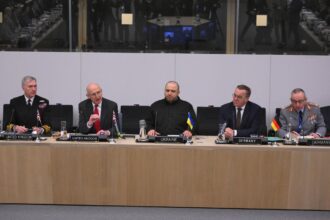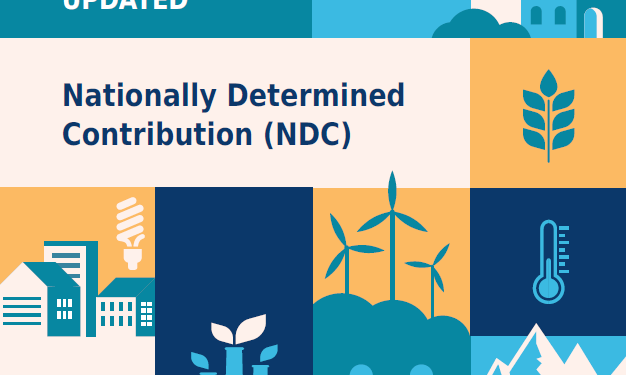Have you ever thought about how much we can do for the world by turning off lights when not needed? If we can, we should ride our bikes instead of driving to reduce air pollution. These measures will be promoted and encouraged by government, but it is up to us – the people – to put them into practice. It is not enough to rely on the efforts of a single ministry or specific agencies to help people understand their role in environmental processes, and specifically climate change.
Georgia’s vision on climate change is best expressed in the updated Nationally Determined Contribution document (NDC).
Georgia’s updated Nationally Determined Contribution document (NDC) of 2021 aims to reduce its total domestic greenhouse gas emissions by 35% compared to 1990 levels. This bold statement reaffirms Georgia’s commitment towards the 2015 Paris Agreement. According to the Paris Agreement the world leaders agreed that they would take all measures to keep the increase in global average temperature well below 2degC over pre-industrial levels.
Georgia, like all other countries, is required to update its Nationally Determined Contribution Document at least every five years, according to the Paris Agreement. Georgia, like other countries, must demonstrate progress in reducing emission, i.e. Each update will include a new estimate of greenhouse gas emissions.
“NDC is an ever-evolving document that must be updated every five years.” This means every five years, the country must develop a new perspective, become more ambitious, and implement ambitious measures in different areas. – Maia Tskhvaradze is the Head of the Climate Change Division of Georgia’s Ministry of Environment Protection and Agriculture.
Georgia, like all other countries in the world, follows the NDC points when planning its climate change policies. Georgia’s vision is to reduce domestic greenhouse gas emissions by 35 percent and implement specific measures by 2030. Specific measures include the development of low-emission transportation networks or the rehabilitation and restoration of forest massifs.
“We have identified seven economic sectors, including energy production, transport, industry and buildings, agriculture, forestry, and waste. We have developed specific measures for each of these sectors and a plan to implement these measures,” says the head of Climate Change Division of Ministry of Environment Protection and Agriculture.
According to the document Georgia plans to reduce GHG emissions in the transport, energy generation and transmission sectors by 15%. In the industry, the plan is to reduce GHG emission by 5%. The document also states that Georgia will increase carbon-capture capacity by 10% through the forestry sector.
Georgia has also undertaken the following commitments:
* Assessing climate change impacts on coastal zones, mountain eco-systems, water resources, and forests, and implementing the appropriate adaptation measures.
* Implementing adaptation measures to the effects of climate changes on the economy, social field and health;
* Facilitating the conservation and protection of biodiversity, including endemic species and those protected by the Red List.
* Reducing the losses and damages caused due to extreme weather events and natural disasters.
Women’s participation in the climate change process is one of the most important components to Georgia’s commitment. According to Maia Tskhvaradze gender and climate change are important areas for Georgia.
“We are one country that has explicitly highlighted this area in our NDC. We want to emphasize that we see our women as agents of the change, because their role is so important in climate change adaptation and mitigation. CENN, for example, actively works on strengthening the roles of women within the EU-supported Georgia Climate Action Project as well as other ongoing projects”, – says Maia Tskhvaradze.
Media and non-governmental organizations play a key role in raising awareness. CENN (also known as the Caucasus Environmental NGO Network) is one of the key players in this process. Maia Tskhvaradze discusses the role of non-governmental organizations in the management of climate changes.
“Together, with UNDP a nationwide opinion survey on public awareness regarding climate change was conducted to learn the level public awareness of climate-change-induced processes. The NGO sector was identified as one of the most important sources of information. CENN informs the media, who are the main sources of information. As part of the campaign to raise awareness, we will be organizing meetings with media in conjunction with CENN. The journalists will then pass on the information they receive to a wider audience,” says Maia Tskhvaradze.
Maia Tskhvaradze, when asked what direction the NGO sector ought to work in, said that the involvement of the public is a major problem. According to her a common platform is being created with CENN and other partner organizations in the framework of the EU supported Georgia Climate Action Project. This platform will engage the public as much as possible in climate change related processes. The platform’s purpose is not just to provide information but also to identify local problems related to climate change and ensure that these issues are reflected within relevant policy documents. The platform will facilitate dialogue, collaboration, and research in climate change.
In any document prepared on climate change, it is important to reflect the views and opinions of the public and to integrate them.
“For example, when we visited target regions of the EU-supported project together with CENN, and met the regional Climate Action Groups established by the Project, we discovered that local people had many specific and fascinating ideas. Therefore, such a platform is very important”, says Maia Tskhvaradze.
The Ministry of Environment Protection and Agriculture of Georgia, in conjunction with the National Climate Change Strategy and Action Plan (NDC), has developed specific actions and measures for reducing greenhouse gas emissions. The country will be able fulfill its international obligations if the Strategy and Action Plan is implemented.
Georgia needs to receive stronger international support to be able to implement ambitious projects. Georgia will be able to reduce its greenhouse gas emissions by up to 57% when it has better access to international resources.
Climate change mitigation measures are expected to contribute to economic growth, improved air and water quality, increased public health, an increase in the number and quality jobs, biodiversity, and new clean technologies.
The EU-supported Georgia Climate Action Project, being implemented by CENN with partner organizations, and similar initiatives implemented other organizations with support from the international community all play an important part in meeting the climate-related obligations undertaken by Georgia as well as in the strategic development.
Read More @ georgiatoday.ge













